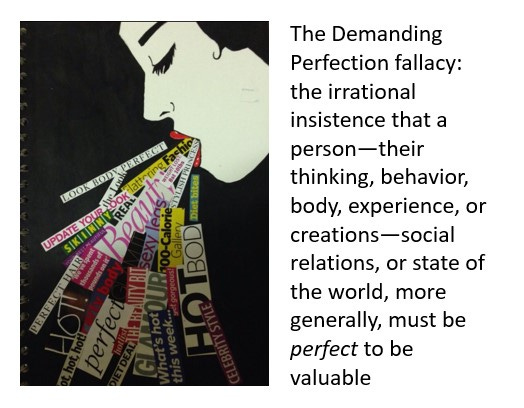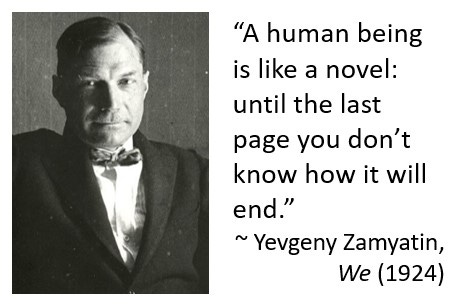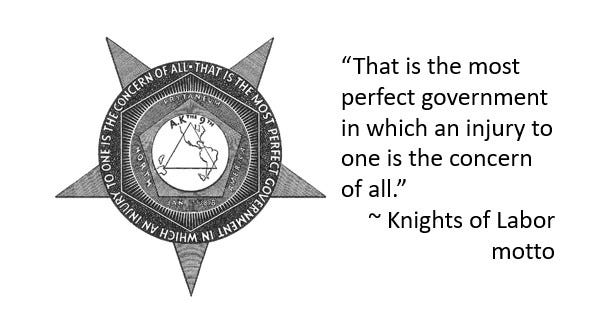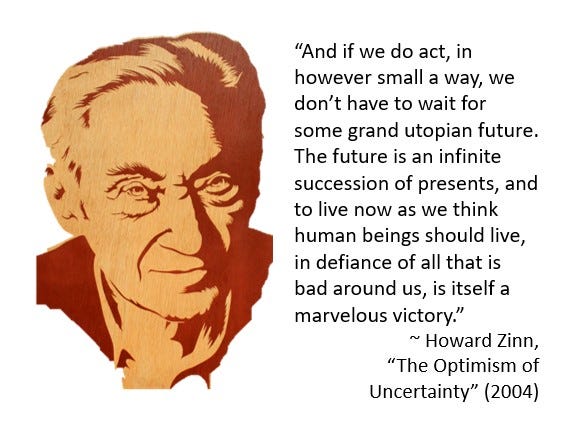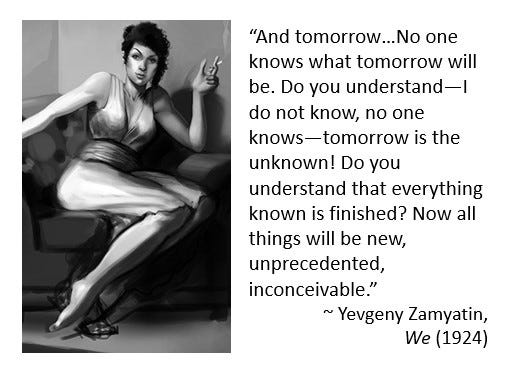Unknown Tomorrow: Doing Our Best without Expecting Perfection
Part three of a series of posts exploring the humanities and social change
We should do our best with the time, abilities, and resources we have. We should also be strategic in our pursuit of tangible, productive results. We certainly should not delude ourselves into thinking we are making a meaningful contribution to social change when we really aren’t.
But it’s just as important to recognize that even when we cannot do all the good we would like to do, we can do some good. And some good is better than no good at all.
One of the greatest enemies of social change is the insistence that our efforts must be perfectly consequential to be valuable—to be worth doing. We often hear that our actions will not “solve” the entire problem or that there is always “some other problem” that we aren’t addressing as we to tackle the one before us.
We need to recognize these lines of thought for the fallacious rationalizations for inaction they are. Specifically, they are instances of the “Demanding Perfection” fallacy:
the irrational insistence that a person—their thinking, behavior, body, experience, or creations—social relations, or state of the world, more generally, must be perfect to be valuable
As philosopher Elliot D. Cohen puts it, “The assumption that ideality, perfection or even near perfection is humanly possible in this earthly universe is false to fact.” Expecting people to be perfect is fallacious because we are inherently imperfect beings. Reasonable expectations of ourselves and each other must take that imperfection into consideration.
When perfection becomes the rubric for judging our efforts, the inability to achieve ideal results becomes a justification for not even attempting in the first place.
When directed at social change, the Demanding Perfection fallacy becomes an insistence that our efforts must result in perfect or near perfect success to be worthwhile. When perfection becomes the rubric for judging our efforts, the inability to achieve ideal results becomes a justification for not even attempting in the first place. In other words, demanding perfection fuels resignation and defeatism.
To realize the flaw of perfectionist thinking imagine 100 children are trapped in a burning building. You have the ability to race into the building at this very moment before the blaze worsens. You can save one and only one life, without any serious injury to yourself. The problem is that you want to save all of the children, but can only save one. You wish circumstances were different but realize you have a timely decision to make. Do you save one child knowing that the other 99 children will die, or do you save none of the children, knowing that all 100 will perish. What should you do?
To refuse to do the painfully limited good within our power because we want to do even more good is to prove that perfection is the enemy of the good
I admit that this is not much of an ethical dilemma. The answer is immediately clear: we will rescue the one child in our power to save. We will all agree that each child’s death is a tragedy. As sensitive beings, we will be pained by the frustrating limitations of our circumstances; that we could only save one when we wanted to save each and every precious, innocent being. And yet it is precisely this sensitivity to human life that rejects out of hand the option of saving none of the children. We must do our best even as we denounce the lack of cosmic justice exemplified in our limited options.
And in that answer we have a resounding verdict against the demand for perfection. To refuse to save any—to refuse to do the painfully limited good within our power because we want to do even more good—is to prove correct the Italian proverb that called perfection the enemy of the good. We would do well to recall the related Chinese proverb:
“Better a diamond with a flaw, than a pebble without one.”
In our case, it is better to humbly exemplify the best within ourselves, striving to do the most good possible, than to succumb to defeatist demands to be perfect or not even try at all.
What it means to do our best will depend on many contingent factors including available resources, capabilities, and opportunities. But we can say, generally, that we can contribute to a just, ethical society by educating ourselves on matters of importance and then communicating those informed judgments to others. We can participate in nonpartisan civic action in our communities, ranging from volunteering to ensuring local government is attending to the needs of the community. We can donate to worthwhile charities and, perhaps even more importantly, educate ourselves on ethical consumption, seeking to purchase ethically sourced and produced goods to the fullest extent possible.
We should also participate in the electoral process, as a voter or even candidate for office. But political engagement need not be confined to voting. We can participate in movement building in support of important causes. We can also participate in pressure campaigns to direct elected officials to tend to the needs and demands of their constituents. Creating art and cultural works that sustain ethical commitments and sensitivities, as well as fortifying and inspiring political engagement, is yet another avenue some might take up.
We have yet another opportunity to do good through our relationships, either as parents, children, siblings, friends, coworkers, or community members. By engaging others in authentic dialogue, seeking understanding and also presenting our best, most informed arguments we pave the way for collaboration, compromise, and the resolution of conflict. And it goes without saying that there are many other ways in which we might do our best to foster an ethically good and just society. The point is that those who dispute such efforts on grounds they fail to perfectly resolve the problem they aim to address are guilty of irrationally demanding perfection. We should evaluate the efficacy or value of our efforts by a more reasonable rubric.
Social Change Frequently Defies Expectations
In addition to rejecting perfection, we can turn to literature and the history of social change to combat irrational pessimism and fatalism about the prospects of fostering a better world. Breakthrough moments of social progress are often born in the very ashes of pessimistic predictions that change is not possible. Many of those who claim that achieved changes were perfectly predictable if not inevitable, do so after the fact—retrospectively.
Humanity’s trajectory is not so easy to determine. Human thought and action often defy calculation, reminding us of the importance of creativity and conviction in shaping the world. The heroine of Zamyatin’s We reminds us of as much when she tells D-503,
“A human being is like a novel: until the last page you don’t know how it will end.”
Read part two, “Values Over Victory: Why We Should Prioritize Exemplifying Our Values Over Winning/Losing”
Drawing on his unique knowledge of movements for social change, the historian Howard Zinn, author of A People’s History of the United States (1980), reminds us that much remains possible even in this moment. In a 2004 essay titled, “The Optimism of Uncertainty,” he explained that fatalistic thinking was often rooted in a limited picture of human history that excluded the inspiring good that people have generated.
“To be hopeful in bad times is not just foolishly romantic. It is based on the fact that human history is a history not only of cruelty, but also of compassion, sacrifice, courage, kindness. What we choose to emphasize in this complex history will determine our lives. If we see only the worst, it destroys our capacity to do something. If we remember those times and places—and there are so many—where people have behaved magnificently, this gives us the energy to act, and at least the possibility of sending this spinning top of a world in a different direction.”
We can use history to buoy our confidence in the possibility of social change. We can, for example, learn about the labor movement in the United States. We can discover how the Knights of Labor began, in 1869, as a secret group of tailors in Philadelphia, and grew into the first major national labor rights group in the United States. The Knights widely promoted the virtue of worker solidarity with the motto,
“That is the most perfect government in which an injury to one is the concern of all.”
At its height, the Knights of Labor's membership approached one million, with thousands of chapters across the nation. Though not immune from racism, the group was nevertheless an early example of successful multi-ethnic organizing. Members included women, people of color, and various ethnic identities that, at the time, were racialized. Hundreds of chapters were organized and operated by women.
Using collective bargaining and strikes, the Knights of Labor fought for the elimination of child labor, improved working conditions, and the eight-hour workday, insisting on eight hours for work, eight for sleep, and eight for leisure. The Knights of Labor also promoted a vision of work in which industries ought to be owned and operated by those who did the work that generated their profits. In 1884 the group used strikes to combat Union Pacific railroad’s decision to significantly cut wages and fire workers at will, going toe-to-toe with railroad magnate, Jay Gould. All this as they were faced with constant repression from powerful political and elite economic interests.


We would do well to recognize that many of the leading figures who helped begin the labor rights movement that we, today, benefit from, did not live to see pivotal reforms. It was not until 1938 that the Fair Labor Standards Act established workers right to a minimum wage, a forty hour work week, and the prohibition of oppressive forms of child labor. An achievement won more than fifty years after the formation of the Knights of Labor.
This victory followed many defeats including the Supreme Court striking down legislation aimed at penalizing businesses that employed children and reversing an executive action to combat child labor by president Franklin Roosevelt. The eventual success of the 1938 legislation was due to the relentless efforts of early labor rights activists including the sociologist and photographer, Lewis Hine, who were driven as much by fundamental commitment to deep and universal human values and not only short-term political calculations.
Today, we live during a time of resurging interest in labor organizing and unionization. But we also see that advances toward greater freedoms for workers is accompanied by fierce resistance of those whose economic power and interests are challenged. Some believe that efforts of Amazon and Starbucks workers to unionize, for example, are doomed. But such mentality not only flies in the face of the often unpredicted and startling victories of the past labor movement, it also ignores that there is something inherently good about taking up causes that matter to us and exemplifying the values we wish to see honored in culture and law. As Zinn wrote,
“And if we do act, in however small a way, we don’t have to wait for some grand utopian future. The future is an infinite succession of presents, and to live now as we think human beings should live, in defiance of all that is bad around us, is itself a marvelous victory.”
Here it is worth acknowledging current efforts to rollback prior labor rights gains are being made at the same time working people are beginning to clamor for greater liberties in the workplace and a more reasonable share of the profits they generate. The U.S. Department of Labor identified more than 3,800 violations of child labor laws in 2022, a more than 25-percent increase from the pre-pandemic violations of 2019. Additionally, 688 minors were determined to be working in hazardous occupations, a 25-percent increase from 2019.
At the same time labor violations involving minors are increasing, state legislatures are seeking to weaken strictures on youth employment. States including Iowa, Ohio, Minnesota, and Wisconsin legislatures have sought to pass bills extending working hours for children. These efforts are aimed at addressing what industry interests describe as "labor shortages" and labor rights groups describe as an unwillingness to fairly and reasonably compensate laborers.
In January 2023, an Iowa bill (Senate File 167) was introduced that would permit children as young as fourteen to engage in manufacturing, mining, loading trucks and railroad cars, and food service prep provided they receive an exception from the director of the Department of Workforce Development or Department of Education. The exception requires the work to be done with “adequate supervision and training,” not to "interfere with the health, well-being, or schooling of the minor enrolled in the approved program,” and the student to be part of "an approved work-based learning program, registered apprenticeship, career and technical education program, or student learner program…." The bill would also allow children, ages 16 and 17, to serve alcoholic beverages in some settings.
In its current form, the Iowa law would limit employer civil penalty to $10,000. It would also shield employers from civil liability when "arising from the student's negligent act or omission" and
“for any claim for bodily injury to the student or sickness or death by accident of the student arising from the business’s negligent act or omission during the student’s participation in the work-based learning program at the business or worksite.”
Such legislation is being rolled out at precisely the same time that one of the nation's largest food safety sanitation companies, Packers Sanitation Services, Inc., has paid more than one million dollars in fines for illegally employing children. In 2022, the Department of Labor determined that the company employed at least 102 children, ages 13 to 17, in hazardous working conditions in eight states. The children were given overnight shifts and were tasked to work with hazardous chemicals and clean “meat processing equipment including back saws, brisket saws and head splitters."
The fact that such backslides on child labor rights are happening less than one-hundred years after the Fair Labor Standards Act was passed reminds us of the limits of making “victory” our aim. Just as there are no final revolutions, there is no final achievement of a permanent justice. We must continuously strive not only to make progress but also to retain it.
Unknown Tomorrow
As we strive to exemplify our values and do the good that is within our power to do, we should remind ourselves that some of the most important changes are generated at the darkest hour. In his final sermon, “I've Been to the Mountaintop,” delivered the day before being assassinated, Rev. King said that if God granted him the choice, he would choose to be alive in the second half of the 20th century over all other ages. King admitted that his choice would seem strange given all of the uncertainty, pain, and conflict of his time. “But I know, somehow,” he explained, “that only when it is dark enough, can you see the stars.”
We find a similar optimism in the possibilities of human agency in Zamyatin’s We. The revolutionary, I-330, carry out a daring act of civil disobedience on the totalitarian state’s “Unanimity Day," a ceremonial election event meant to solidify support for the ruler, the Benefactor. Yet I-330 and her fellow revolutionaries violate the law and rose to vote against the Benefactor during the ceremonial election in which everyone is predetermined to vote in favor of the perpetual ruler, and no one is to raise their hand when asked for those who vote against him. The secret police—The Guardians—quickly and violently respond by seizing dissenters. After escaping capture, I-330 euphorically reflects upon the significance of their otherwise trivial interruption of the One State’s status-quo. I-330 observes that their dissent indicated the openness of tomorrow so often treated as a predetermined reality.
“And tomorrow…No one knows what tomorrow will be. Do you understand—I do not know, no one knows—tomorrow is the unknown! Do you understand that everything known is finished? Now all things will be new, unprecedented, inconceivable.”
Through I-330, Zamyatin reminds us that humanity’s history is never complete—never finalized—so long as the human heart is sustained by imagination, empathy, and autonomy. We are not guaranteed victory but neither are we guaranteed defeat. Perhaps it is best to follow John Holt’s advice to concentrate less on predicting outcomes than deciding what kind of world we want to live in and doing what we can to make that world come into being.
Please share and like this post by clicking the heart icon.
Invite Dr. Nall to Speak
Dr. Nall delivers energetic live presentations and engaging workshops on the subjects featured in Humanities in Revolt. Those interested in booking a workshop or talk can get in touch through Facebook or by leaving a comment.
Subscribe
Subscribers will receive periodic posts pertaining to the broad domain of humanistic inquiry, from the insights of great thinkers throughout human history, the meaning and importance of critical thinking and ethics, the underappreciated poetry in everyday existence, to contemporary cultural analysis and the ongoing struggle to combat human oppression and violence. You will also have the opportunity to engage the author and our online community in dialogue about each post.
Why get a paid subscription?
Paid subscriptions directly support Dr. Jeffrey Nall’s efforts to produce and share publicly accessible independent scholarship and analysis. Supporting donations can also be made through PayPal. For more about my work go to JeffreyNall.com and find me on Twitter, Facebook, and Instagram.




